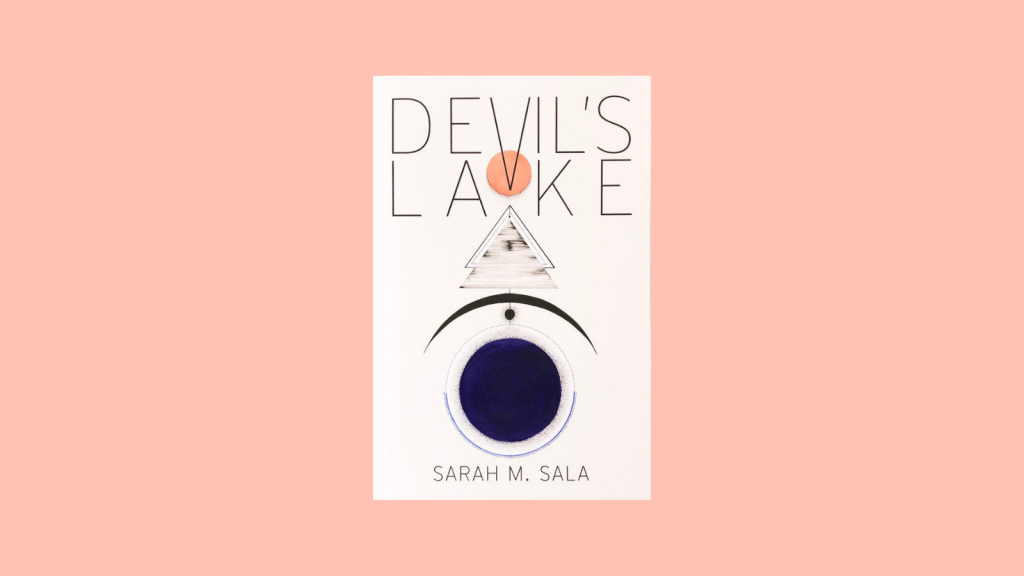The central voices of Sarah M. Sala’s debut collection Devil’s Lake are looking for something eternal within a catastrophic and violent world. They are looking for a time before the concreteness of the human body and its prescribed ills. They are looking for the body’s after. Described as a verb in the poem “Rothko’s Chapel,” the selves generated in this collection are inquisitive, unafraid to name the sources of their grief: homophobia, ecological collapse, otherness, and violence, and continuously contending with forging a place of sanity in the universe’s vastness. Through the exploration of strained body-self relationships, scientific facts, history, love, loneliness, queerness, and hate, Sala weaves together narratives that ask their readers to consider where they came from, how they are engaging with time— however wrought and distressing— and where they will return to after death. If the poem’s opening epitaph by Emily Dickinson, “I am out with lanterns, looking for myself,” is any indicator of how we should read Sala, by embarking on this poetic journey and breaking down the walls surrounding our perception of the self, we shall arrive at a clearer, but perhaps never entirely whole, understanding of what it means to live in this troubling world.
Getting straight to ideas of existentialism, Sala’s opening poem, “Hydrogen,” situates the speaker at the very beginning of the universe: “First I was a star, then a strain of water, then a kindergartener” (3). This temporal collapsing surrounding the speaker is a repeating theme throughout the collection. Rather than give in to the conceit of giving oneself omnipresence, Sala acknowledges the speaker’s origins as an inconsequential atom. While this sort of reduction may be fear-inducing in others, Sala frames it as welcoming with, “ions of cosmos cartwheeling pink/ red yellow green purple blue black in the sphere of night” (3). The ethereal world of atoms and the greater cosmos is a space that Sala introduces as a continual as a comfort.
Much of the haunting beauty of this collection is in Sala’s startling image-system with which the audience enters moments of death and pain. Contained in Devil’s Lake is a series of small and large elegies. “Nature Poem,” which entails the brutal murder of two lesbian women hiking the Appalachian Trail, is perhaps the most startling as Sala pulls from a readily identifiable event. In fact, Sala encourages us to identify the horror by including a facsimile of an evidence tag, naming both women, Claudia Brenner and Rebecca Wigh, the location of their attack, and explicitly detailing the queerness of their relationship. Moments like,
“Later, I passed a girl seated in a sunflower field I knew it was you even if you were gone..”
are simple but carry great gravity to them. The stanzas, sparsely populating each page in the sequence, also show careful syntaxial consideration. In this long drawn out form, the concise lines evoke a feeling of breathlessness and of continual pause between what has happened and fear of what will happen next. The white space gives us a moment to contemplate the ghostly apparition detailed above, to mediate on its presence, and absorb its significance.
While grappling with these dark themes, Sala also manages to express moments of wholeness and still peace. It is in her unabashedly sapphic love poems, which are at once gently worded and lustful, where she introduces love as a path to fullness. This is evident in “Rainstorm Reminded Me Why I Love:”
When I heard wife, my belly went reverent with breath. I was organizing upholstery swatches when the sky broiled the streets in an ancient lake of steam. I sensed your body bed down beside mine on a cool night and it left me full and wanting. Kissing you felt like the shiver of athletic prowess sideswiped by the pleasure of language. Marriage equality didn’t exist until a year into our marriage. We weren’t going to abandon our attractions, but swerve into them” (14).
Amidst the landscape of chaotic weather and pre-human-like rains, the speaker finds respite in interpersonal passion. These love poems suggest that it is in the presence of another that one feels whole.
Sala, however, is aware that the human heart is a contentious thing. It is prone to failure. After all, “the human heart weighs only as much as a can of coke” (8). While love is a net positive, its absence, or an otherness in the understanding of love, is one of the ills explored. Homophobia is one such absence illustrated in a series of blackout poems, “On Receiving a Homophobic Letter: A Series of Erasures.” With a sense of levity and snark, Sala subverts the intentions of a letter that aim to dismiss the importance of the speaker’s queer relationship. Through the stark black of erasure, Sala suggests that the letter writers have become empty themselves. These re-imagined speakers are thoroughly dissatisfied, going as far as to “lay there/ with no/ body” (23). In the last erasure exercise, Sala emphasizes love’s paramount place through a reminder of how to address others. In an act of vengeful ventriloquism, “Variation III” ends with the letter writer uttering, “you are/ my heart/ you/ you/ you” (25).
While Devil’s Lake offers little remedy to the distressing place we societally find ourselves in now, it steers a critical eye towards ills and experiences a modern reader may also face. Sala’s verse, empathic voice, and speculative phrasings complicate these spaces of grief and hurt. They try to get to the larger question of the self and how we are meant to live in interconnectedness.




